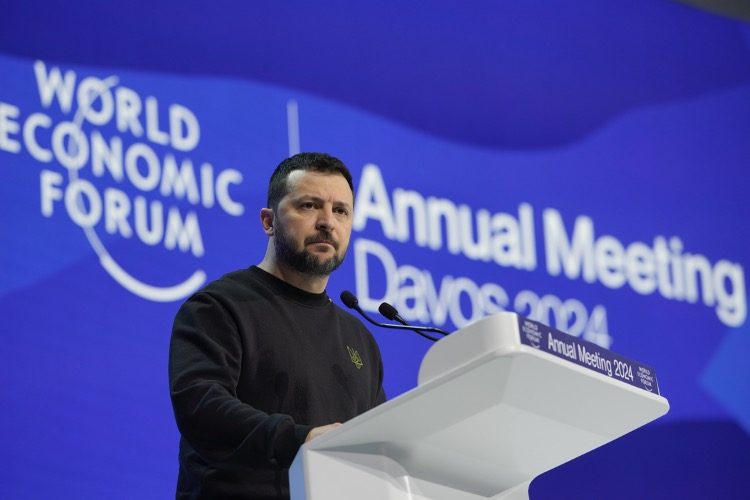
While speaking to an audience of the world’s top globalists, Ukrainian President Volodymyr Zelensky apparently felt comfortable enough to shed any pretense to wartime ethics, making a direct threat against the family of Russian President Vladimir Putin.
The Ukrainian head of state made his remark while addressing a gathering of global aspiring leaders at the World Economic Forum in Davos, Switzerland.
As reported by Russia Today, Zelensky declared that even Putin’s children and grandchildren will be subject to “criminal trials.” Describing the Russian leader as “the sole reason why various wars and conflicts persist,” the Ukrainian president argued that holding Putin accountable is necessary in order to avoid the emboldening of other “autocracies.”
“Yes, we are not terrorists, and therefore these will be criminal trials,” said Zelensky, adding that Putin will not “rest in peace, both in this world and in the next. Neither his children, nor his grandchildren.”
Zelensky’s comment notably came a day after Anne Applebaum, an American journalist and wife to Polish Foreign Minister Radek Sikorski, made the claim that Putin has a grandson with Dutch citizenship. Vladimir Putin is known to have two daughters, who have stayed out of the public eye.
The remark also comes only days after the death of American journalist Gonzalo Lira in Ukrainian prison; Lira was being held in custody for criticizing the Zelensky and Biden governments and claimed to be tortured by other inmates while imprisoned.
Zelensky has also been in continued talks with top U.S. officials. As The Hill reports:
Secretary of State Antony Blinken and national security adviser Jake Sullivan met with Zelensky on Tuesday, according to a press release from the State Department.
“They discussed the importance of continued global assistance to support Ukraine as it fights for its freedom and sovereignty,” State Department spokesperson Matthew Miller said. “They also spoke about efforts to support Ukraine’s economic resilience and recovery, including through private sector investment.”
“The three additionally discussed ongoing anti-corruption reform efforts to bolster Ukraine’s economic recovery and continue its trajectory towards Euro-Atlantic integration,” Miller continued.
Putin has fired back at Zelensky’s calls for peace talks, panning such rhetoric as “attempt to force us to give up the gains we have made.”
Ukraine has said that in 2024, it aims to “throw Russia from the skies,” a response to Moscow’s firing nearly two dozen drones and missiles over the border. In recent days, fighting has intensified in eastern Ukraine as Russia has stepped up its offensive assaults.
Curiously, one feature of this year’s World Economic Forum in Davos is Zelensky’s 10-point Peace Formula, a list of demands that include the withdrawal of Russian troops, the creation of a Nuremberg-style special tribunal to prosecute Russian war crimes, and the complete restoration of Ukraine’s territorial integrity.
So-called peace talks are unlikely, however, so long as they continue to exclude one of the two warring parties — Russia. Ultimately, Ukraine’s demands are unlikely to be realized so long as it alone fights the superior Russian forces.
For Zelensky, the situation appears to be increasingly desperate as Kiev finds itself unable to repel the Russian invasion, and the only thing preventing a total fall into Putin’s hands is the vast amount of weapons and money that the West is pouring into the Zelensky regime.
The likelihood of that funding continuing, however, is declining as the United States and its allies find their attention diverted elsewhere, particularly the Middle East. A U.S.-led coalition has been conducting strikes against the Houthis in Yemen in response to the militia’s constant attacks on western commercial vessels in the Red Sea.
The disruption of American trade was a major boost to Russia, which has had its commerce undisturbed by the Houthis, as the latter are funded and controlled by Iran — an increasingly important Russian ally.
While correlation does not necessarily equal causation, it is nevertheless clear that the Houthi aggressions have greatly benefited Moscow as far as putting it at a competitive advantage over the West with regard to global trade. In addition, the fact that the United States and its allies are now involved in a conflict — albeit a very limited one — takes some pressure off of Russia while using up resources and attention that would otherwise go to Ukraine.
The question of what the United States and the European community will make of the Ukraine conflict is ever on the mind of foreign policymakers. Can the American establishment afford to let Ukraine lose? What would such a loss mean for the future balance of power in Europe? Washington’s near-unquestioning support for Kiev indicates that the political class fears a major shakeup to U.S. hegemony if Russia is able to claim victory in Ukraine.
For the time being, then, the establishment is likely to continue to push as hard as it can for the Ukraine aid to continue, even if it must do so over the protests of increasingly skeptical Republicans in Congress. If the Russia-Ukraine conflict extends beyond the 2024 election, then the potential election of Donald Trump could prove to be a major spoiler in the outcome of the war.



